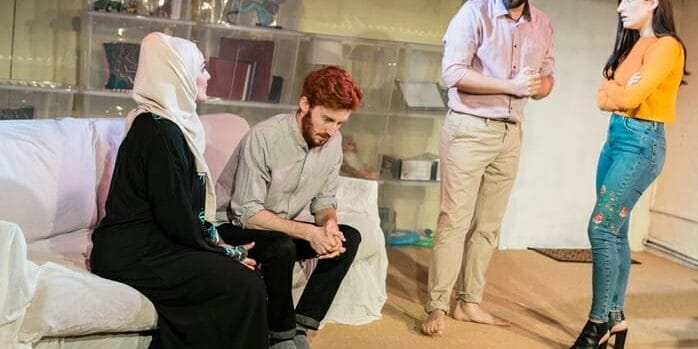
How would you react to a family member converting to another faith? Especially when it’s a faith that’s often unjustly vilified by the media. Based on writer Annemiek van Elst’s real life experience of her brother converting to Islam, Becoming Mohammed at The Pleasance Theatre explores the cultural clashes inevitable in such a situation.
Thomas and his sister Sarah haven’t seen each other for two years, when she turns up unexpectedly at the family home they now jointly own, Thomas must hide the fact that he’s converted, or ‘reverted’ to use the correct term, to Islam. Sarah then meets his fiancé Aminah and chaperone Musa, when Thomas turns down a drink and refuses a sausage roll from the local baker, Sarah at first quips, then realises her brother is now a Muslim.
Sarah struggles to understand, “even Scientology has a better reputation these days” she tells her brother, who by now, has changed his name to Mohammed. Conflict ensues as each of the characters fails to see the others point of view.
In the role of Thomas/Mohammed, Jack Hammett couldn’t look less like a Muslim, but of course that’s what makes it work. He brings out the boundless enthusiasm the character has for his new religion and ultimately it’s Hammett’s performance that makes the plot relatable. He works well with Philippa Carson in the role of Sarah, together they are the typical brother and sister, and a late night scene watching home movies on the sofa gives an insight to their once close relationship.
Nadia Lamin is wonderful in the role of Aminah, in the first act she wears the hijab and is polite and respectful. In the second act she quite literally lets her hair down and the character takes a more confident stance. Jonah Fazel brings more to the character of Musa than the often-repeated catch phrase “time out” and does the most to highlight cultural similarities.
The staging looks good, with the contents of the family home packed in to large plastic boxes, the theme of packing up and moving on prevalent throughout. Between scenes the boxes are rearranged for various purposes, but this often feels like it’s taking a touch too long and distracts from the story. Similarly, these interludes are punctuated with repeating, ominous sounding beats that become a little irksome the more we hear them.
Becoming Mohammed is an often funny look at preconceptions of religion, it’s also a shocking, disturbing even, look at the violations of people’s rights and freedoms. Mostly it’s a story about family, and while it ends rather abruptly it highlights that for these characters this is really just the beginning.
Read our Interview with Annemiek van Elst here.



























